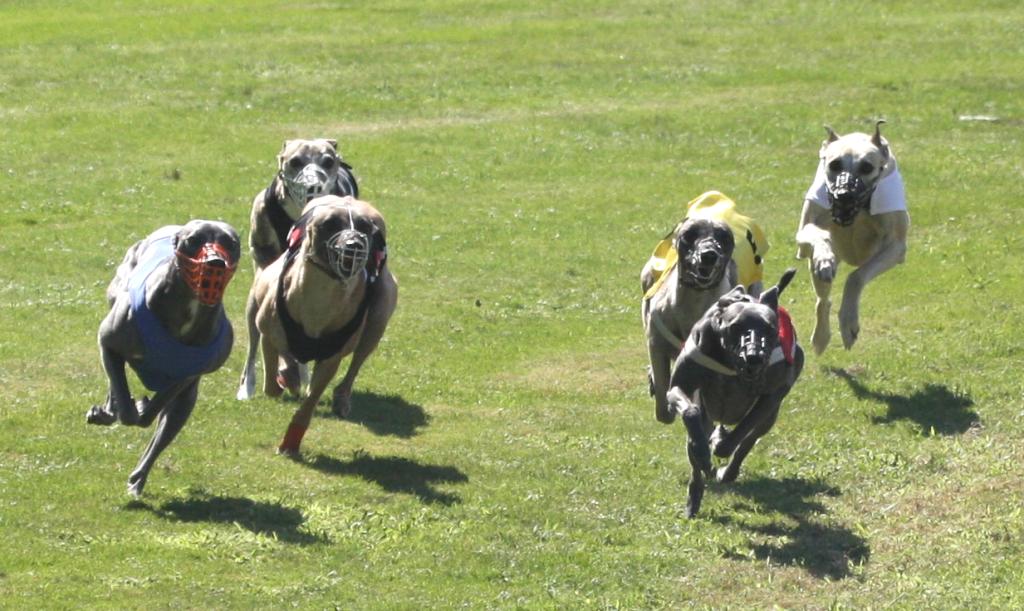World Championship with minor blemishes
Petrol costs, motorway tolls and new rules affect the number of entrants in Mont-de-Marsan.
© Marina Franz
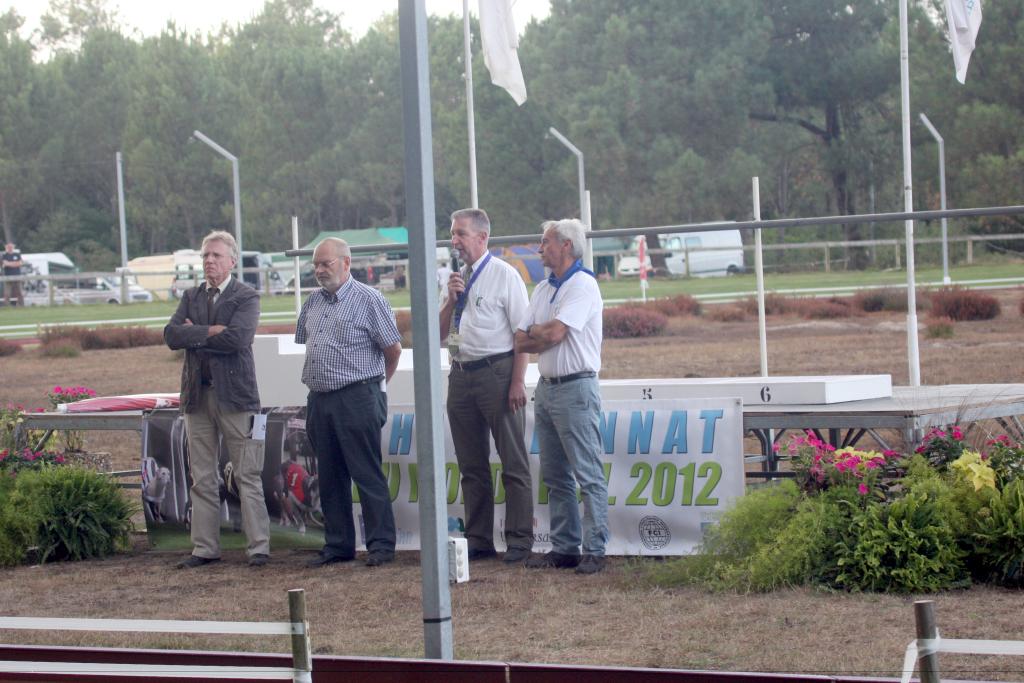
The South of France called – but the number of participants was not very high. Precisely
260 sighthounds from 13 countries had registered for the World Championships in
Mont-de-Marsan on 1-2 September, considerably fewer than for similar competitions
in 2000 (World Championships) and 2005 (European Championships) at the same venue.
However, the final number of competitors actually going to the start was even lower
on account of a number of owners not wishing to undergo the stress and strain of
the long journey.
The weather was fantastic, though, with the sun shining from a clear blue sky on
both days, a brisk northeast wind and temperatures between 22 and 25 degrees. Things
had been rather different at the European Championships held in Mont-de-Marsan seven
years ago when the mercury climbed to considerably more than 30°C on both days,
with the temperature for the final races on Saturday even rising to over 35 degrees.
© Marina Franz

But let’s keep everything in order. When the time came to make plans for the journey
to the World Championships in the South of France, a number of World Championship
entrants decided to combine the rather costly journey with a holiday on the Atlantic
coast, in the Pyrenees or somewhere in a wine-growing area, where they could relax
for a few days eating and drinking traditional specialities. The reason for this
is that the cost of travelling to France is now pretty steep. The ViaMichelin route
planner, for example, gives a distance of 1,432 kilometres for a journey from Kassel
in Germany to Mont-de-Marsan by car and caravan, with direct costs of € 271.00,
i.e. € 150.00 for fuel and € 121.00 for French motorway tolls. And that is for a
single journey, mind you, not including any breaks, food or drinks. In view of what
are now horrendous prices and fees, the author of this report also opted for this
holiday variation, going on a caravan journey to the south with his wife and friends
from the Saarland region on the Wednesday and Thursday before the event. There were
two stages planned for the journey there, staying overnight at a camping site in
Gien directly by the River Loire.
© Marina Franz
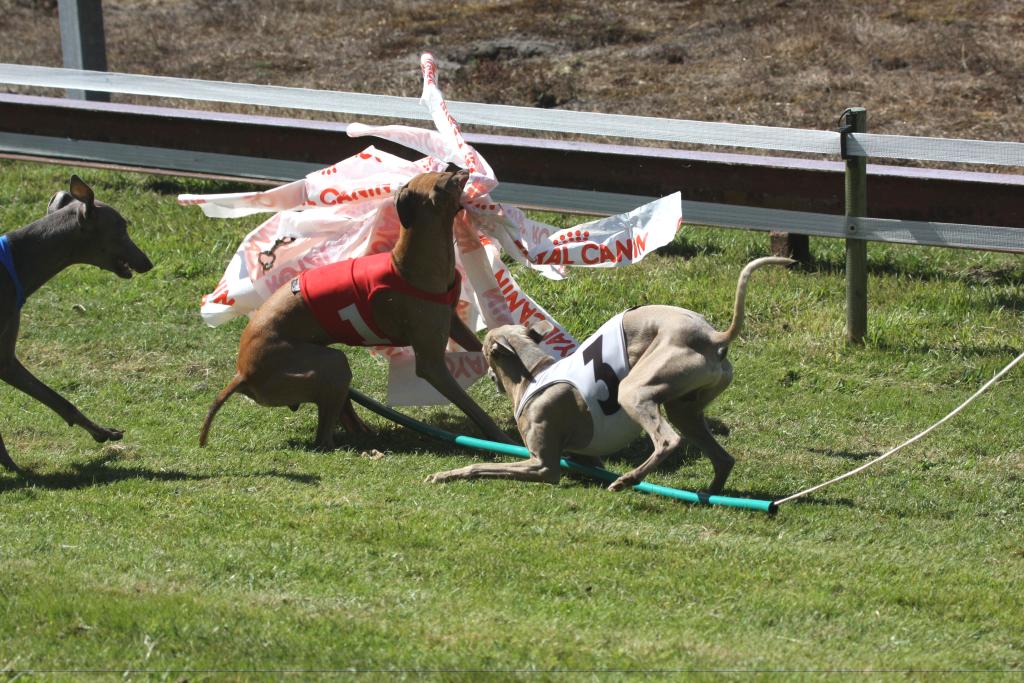
All the conditions for a successful World Championship event in Mont-de-Marsan would
therefore appear to have been met. But alas, there were a number of differences
and mistakes that should not really be expected at a World Championship tournament.
It all started with veterinary checks on Friday evening, where the entry prizes
were handed out and checks were conducted to make sure the stated chip and tattoo
numbers were correct. A look was also taken under the tails of the bitches in order
to establish if they were on heat. However, the hope that a vet would at least check
the health/condition of the animals in the paddock prior to the race was in vain.
And this veterinary restraint became the rule for the entire event up to the final.
The second annoyance was even worse for the competitors, however. Although the times
of the heats were crucial for the positions in the semi-finals, not one single heat
time was announced over the PA system. Only the team captains were given a printout
of the data for the individual breeds, with the participants not finding out until
after a delay of half an hour or more what times their dogs had run.
© Marina Franz
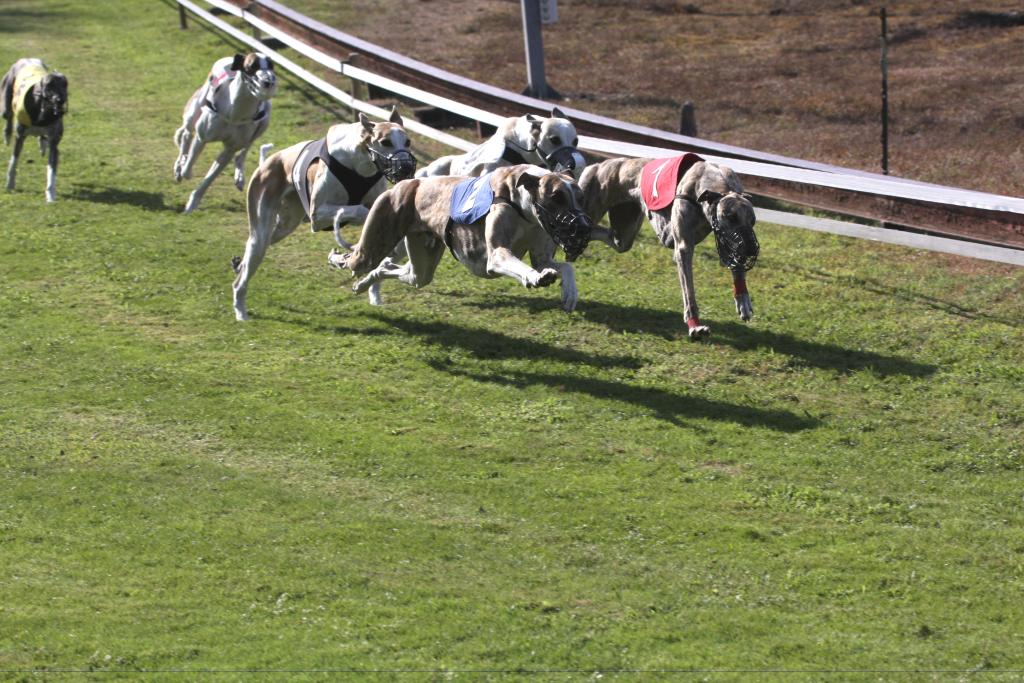
The running and the atmosphere of these World Championships could best be described
as “modest”. At the opening ceremony on Friday evening, there was a parade of the
team captains with the flags of the participating countries and a few short speeches,
during which the head of the European Sighthound Commission, Martin Haas, thanked
those helping locally for their efforts. It was the third time here in the South
of France, commented Mr Haas, who added, “I always love coming back here.” However,
coming back would be a bit better it there was something to make it more homely
on the site, like the members of the local rugby club who created a rustic, French
atmosphere back in 2005 with their music and drinks stand.
© Marina Franz
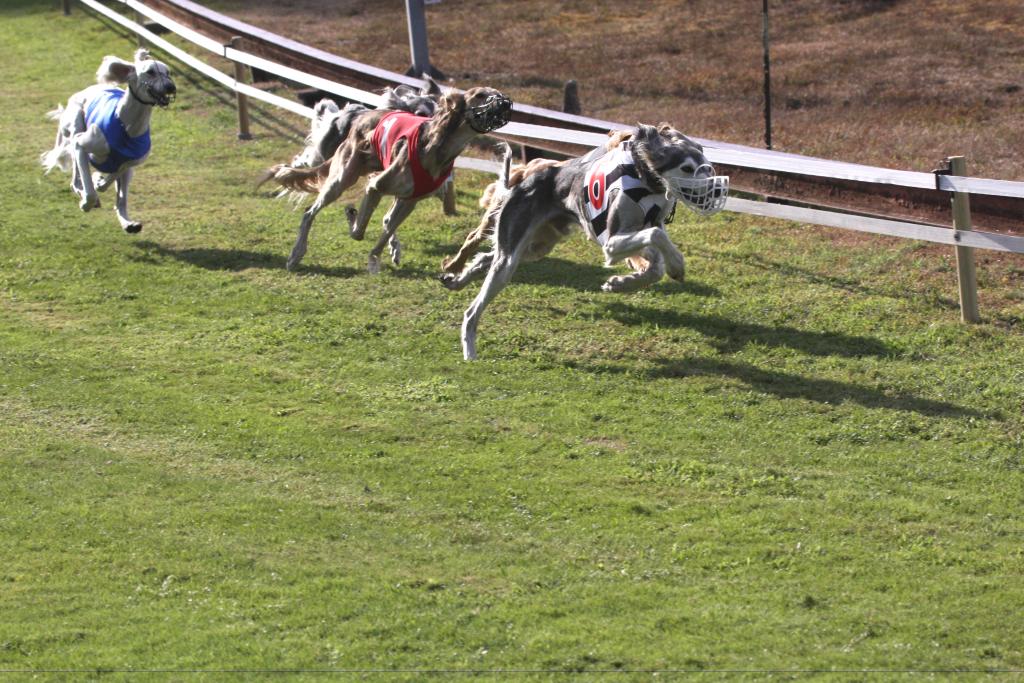
But back to the Championships. For the first time at a World Championship event,
there were no “friendly” races. Those were the races between candidates for the
World Championship starting lists which had often created considerable delays at
previous events. Instead, each country had the possibility to start 12 dogs per
breed and gender rather than the previous 6 animals. However, this enlarged quota
was only taken full advantage of by the Whippets of the French (twice) and the Belgians
(once). The daily programme had been chosen in such a way that the large breeds,
e.g. Afghan Hounds, Azawakhs, Borzois, Spanish Greyhounds, Greyhounds and Hungarian
Greyhounds, as well as Pharao Hounds and Salukis, would go to the start on Saturday,
while Sunday was reserved for the runs involving the Italian Greyhounds and Whippets,
with the advantage that the starting boxes did not have to be changed between the
individual breeds.
Saturday, 1.9.2012
Sunday, 2.9.2012
Commission President Martin Haas’ summary of this event was somewhat ambivalent:
“We can be pleased with the Championships in overall terms even though there were
a few problems. Nevertheless, we can also be happy that there were not 400 entries.”
Mr Haas also felt it was not right that the heat times and details were not announced
promptly via the PA system: “If the heats are decided on the basis of time, the
times also have to be made known.” On the other hand, this is not absolutely necessary
for the semi-finals, added Haas: “Everyone saw that your dog came second or third.”
Moreover, he defended the new rule under which only one timed heat decided who got
to the semi-finals and then which dogs qualified for the final. This meant that
the animals were introduced to the commotion of the 6-dog fields very early on,
which most of them were unaccustomed to. According to Martin Haas, “The dogs have
to learn to run in large fields from the outset, otherwise they well never win anything.”
It furthermore struck him that the Hungarian national anthem could not be found
for one of the presentation ceremonies on the Saturday, leading to a somewhat embarrassing
5-minue delay until the anthem was then finally played. Haas was otherwise generous
with his recognition of the organisers: “The tone and atmosphere was incredibly
friendly, also towards the officials. Not a bad word was spoken.” He also emphasised
the willingness to make corrections: “It was a pleasant working atmosphere for the
team captains; faults that were found were also taken into account.”
© Marina Franz
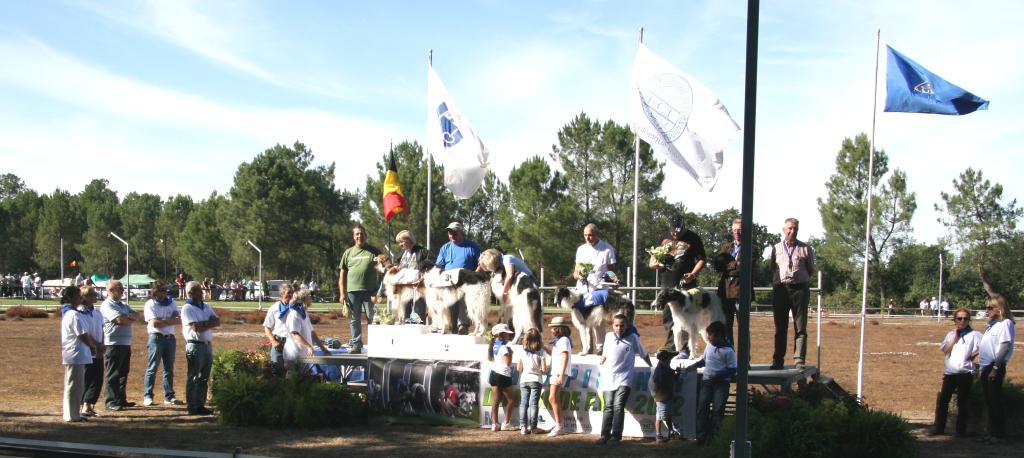
On the sidelines of the sighthound competitions, discussions were also conducted
on how things could proceed in the future with major events like European and World
Championships – also after the lack of satisfaction with the European Coursing Championships
in Hungary. So, what is the future for the World and European Championships in sighthound
sport? This is a question that was frequently asked. Awarding the events only to
the Netherlands, Belgium and Germany would not be a solution because the requirement
to retain a balanced presence in the member countries must be maintained. The problems
are getting bigger, though – with the organisation as experienced in Oirschott (NL)
last summer, or with the secretariats as seen this year in Hungary and France. Nonetheless,
Haas is quite confident: “There are other clubs and associations that can run such
events.” This will then have to be shown next year when the European Championships
are held in Versoix by Lake Geneva. And the journey to the championships after that
in Tampere (FI), to be held on sand, will not exactly drive entry numbers up, either,
given that the travel and ferry costs will be even higher than those for the fuel
and motorway tolls to travel to Mont-de-Marsan.
© Marina Franz
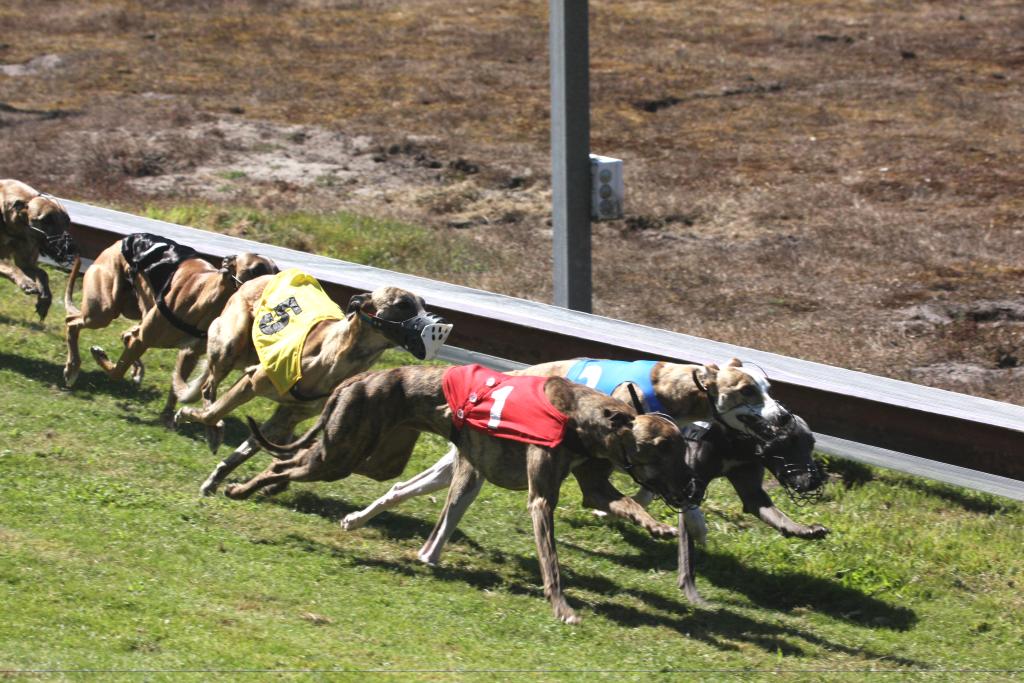
Gerhard Franz
© Marina Franz
